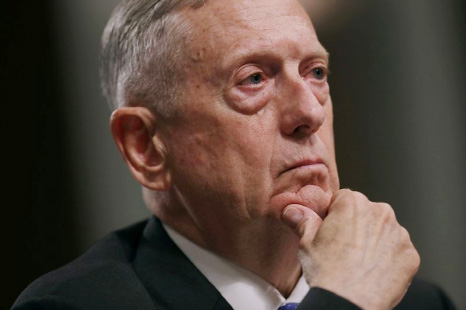
AFP, Washington :
The United States reacted angrily Wednesday after Turkey’s state news agency disclosed the locations of American military posts in northern Syria, a move the Pentagon warned could put lives at risk.
The Anadolu Agency (AA) published a report Monday detailing the 10 US military facilities’ whereabouts and, in some instances, the number of special operations forces working there.
Pentagon spokesman Major Adrian Rankine-Galloway said the release of sensitive military information exposes coalition forces to “unnecessary risk.”
“While we cannot independently verify the sources that contributed to this story, we would be very concerned if officials from a NATO ally would purposefully endanger our forces by releasing sensitive information,” Rankine-Galloway said.
“We have conveyed these concerns to the government of Turkey,” he added, noting that the Pentagon would not comment on whether the locations listed by AA were accurate.
AA said the bases-two airfields and eight military outposts-are being used to support the Kurdish Democratic Party (PYD) and its armed wing, the Kurdish People’s Protection Units (YPG), which Ankara views as an affiliate of the Kurdistan Workers’ Party (PKK).
Turkey views the PKK as a terrorist organization and the group has waged an insurgency since 1984 that has killed more than 40,000 people in Turkey.
Despite being NATO allies, the United States and Turkey have a fraught relationship over the current US-led coalition effort to defeat the Islamic State group in northern Syria.
America is relying heavily on YPG and other Kurdish elements to conduct the fighting on the ground. And it has shipped weapons to the Kurds in a move that infuriated Turkey, which worries the guns will end up in the hands of the PKK.
AA said one post in the town of Ayn Issah in northern Raqa governorate housed around 200 US soldiers and 75 French special forces troops.
Rankine-Galloway urged all factions to remain focused on the fight against IS.
Meanwhile, Germany on Thursday vowed stinging measures impacting tourism and investment in Turkey and a full “overhaul” of their troubled relations, signalling its patience has snapped after Ankara’s arrests of human rights activists.
The foreign ministry stepped up its travel advisory for the NATO ally, warning it could no longer guarantee its citizens’ safety amid “arbitrary” mass arrests, a step set to impact Turkey’s crucial tourism sector.
Foreign Minister Sigmar Gabriel, a day after summoning Turkey’s ambassador, returned from holidays to Berlin to deliver his unusually strong comments towards President Recep Tayyip Erdogan.
Relations between Turkey and Germany, home to three million ethnic Turks, have been badly strained, particularly since the failed coup attempt a year ago against Erdogan.
Gabriel said Germany would review state guarantees for foreign investment in Turkey and urge businesses against putting their money there, and also review its support for EU financial flows to the long-time aspirant to membership of the bloc.
The United States reacted angrily Wednesday after Turkey’s state news agency disclosed the locations of American military posts in northern Syria, a move the Pentagon warned could put lives at risk.
The Anadolu Agency (AA) published a report Monday detailing the 10 US military facilities’ whereabouts and, in some instances, the number of special operations forces working there.
Pentagon spokesman Major Adrian Rankine-Galloway said the release of sensitive military information exposes coalition forces to “unnecessary risk.”
“While we cannot independently verify the sources that contributed to this story, we would be very concerned if officials from a NATO ally would purposefully endanger our forces by releasing sensitive information,” Rankine-Galloway said.
“We have conveyed these concerns to the government of Turkey,” he added, noting that the Pentagon would not comment on whether the locations listed by AA were accurate.
AA said the bases-two airfields and eight military outposts-are being used to support the Kurdish Democratic Party (PYD) and its armed wing, the Kurdish People’s Protection Units (YPG), which Ankara views as an affiliate of the Kurdistan Workers’ Party (PKK).
Turkey views the PKK as a terrorist organization and the group has waged an insurgency since 1984 that has killed more than 40,000 people in Turkey.
Despite being NATO allies, the United States and Turkey have a fraught relationship over the current US-led coalition effort to defeat the Islamic State group in northern Syria.
America is relying heavily on YPG and other Kurdish elements to conduct the fighting on the ground. And it has shipped weapons to the Kurds in a move that infuriated Turkey, which worries the guns will end up in the hands of the PKK.
AA said one post in the town of Ayn Issah in northern Raqa governorate housed around 200 US soldiers and 75 French special forces troops.
Rankine-Galloway urged all factions to remain focused on the fight against IS.
Meanwhile, Germany on Thursday vowed stinging measures impacting tourism and investment in Turkey and a full “overhaul” of their troubled relations, signalling its patience has snapped after Ankara’s arrests of human rights activists.
The foreign ministry stepped up its travel advisory for the NATO ally, warning it could no longer guarantee its citizens’ safety amid “arbitrary” mass arrests, a step set to impact Turkey’s crucial tourism sector.
Foreign Minister Sigmar Gabriel, a day after summoning Turkey’s ambassador, returned from holidays to Berlin to deliver his unusually strong comments towards President Recep Tayyip Erdogan.
Relations between Turkey and Germany, home to three million ethnic Turks, have been badly strained, particularly since the failed coup attempt a year ago against Erdogan.
Gabriel said Germany would review state guarantees for foreign investment in Turkey and urge businesses against putting their money there, and also review its support for EU financial flows to the long-time aspirant to membership of the bloc.

